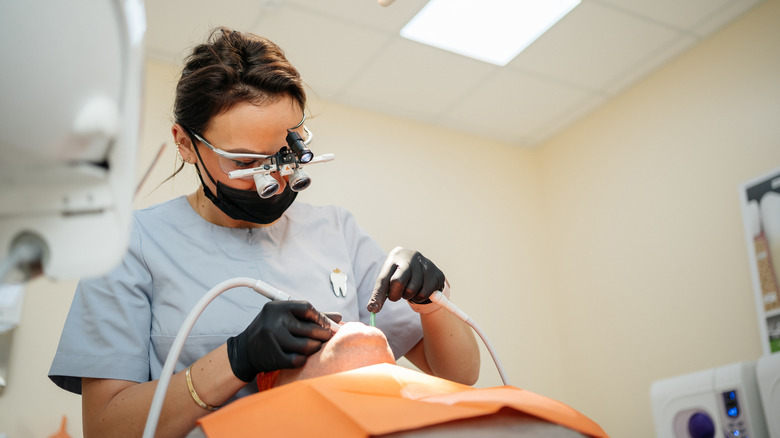Medicare Covers These Dental Procedures - But Only In Rare Cases
There are many healthcare benefits with Medicare, but as far as the program is concerned, it doesn't cover most dental care, treatment, fillings, or removal of teeth, according to its official site. This is also true for cosmetic surgeries. Yet, it will step in if the dental work is directly tied to a covered medical procedure. For example, if a person needs a tooth pulled before heart surgery.
If the dental work happens in a hospital, Part A may cover it. If it's done at a dentist's office or outpatient clinic, it runs through Part B. Part A kicks in when a person is admitted to the hospital as an inpatient. Medicare covers the cost of the hospital room, nurses, and operating room. In 2025, the patient will first pay $1,676 for that hospital stay. After that, the first 60 days are fully covered. If they are there past day 60, they will pay $419 per day starting from day 61.
Medicare Part B pays for outpatient care, like visits to the doctor, tests, and procedures done outside a hospital stay. So, if a tooth needs to be pulled for "outpatient dental services directly related to certain covered medical treatments," and it's done in a dentist's office or outpatient clinic, that bill goes to Part B, meaning the patient pays the first $257 in medical bills for the year. After that, Medicare pays 80% of the approved cost, and the beneficiary pays the other 20%.
The rare cases
There are three big situations where Medicare helps cover dental work: heart-valve surgery, organ or bone-marrow transplants, and cancer treatment. Centers for Medicare & Medicaid Services (CMS) says these dental services are "inextricably linked" to the surgery's success. For heart-valve surgery, if a cardiologist writes an order saying dental care is needed before the procedure, Medicare Part B can pay for the dental exam, panoramic X-rays, tooth extractions, or deep cleanings to clear out any infection.
For solid-organ and bone-marrow transplants, Medicare follows the same steps it does for heart procedures. If the transplant team refers the patient for dental clearance, Medicare Part B will help pay for the exam and any treatment needed to clear infections before surgery. In cancer treatment, if the patient is starting head-and-neck radiation or strong chemotherapy, Medicare Part B can cover dental work like extractions, deep cleanings, or gum surgery to prevent serious infections or bone damage.
Medicare has a few more rare cases. It also covers the cost of rebuilding a dental ridge during the removal of a jaw or facial tumor, and the cost of wiring or splinting a patient's teeth after a broken jaw or dislocated joint, or if a dentist removes a patient's teeth to prepare the mouth for head-and-neck radiation. As of January 2025, Medicare's Physician Fee Schedule added coverage for dental exams, X-rays, and deep cleanings if a kidney doctor orders them before or during dialysis for end-stage kidney failure.
How to claim Medicare's dental coverage
If the patient is scheduled for either a heart-valve replacement, organ transplant, or cancer treatment, the cardiologist, transplant surgeon, or oncologist has to present a medical record saying the dental work is medically necessary. That document is what ties the cleaning, extraction, or exam to the bigger medical procedure. Without it, Medicare won't cover the cost. Centers for Medicare & Medicaid Services (CMS) calls this treatment connection "inextricable," and made it clear in its 2023 to 2025 rules; doctors and dentists must work together, and the paperwork has to show that link, or the claim won't go through.
For the dentist's paperwork, each chart note must clearly explain why a tooth is being pulled or why a deep cleaning is needed. For example, "to remove oral pathogens before valve replacement," so it's clear the care is tied to infection control, not routine dental work. To meet Medicare's requirements, the dentist must use the correct CDT or CPT codes when submitting the claim.
Ass of July 1, 2025, all dental claims connected to surgeries like valve replacements or transplants must also include two critical details; an ICD-10 diagnosis code and the KX modifier on the 837D form. If either one is missing, Medicare's billing contractors may reject the claim under Section 411.15(i). This will be unpleasant, especially for seniors still bearing the brunt of the Medicare hike of 2025.


